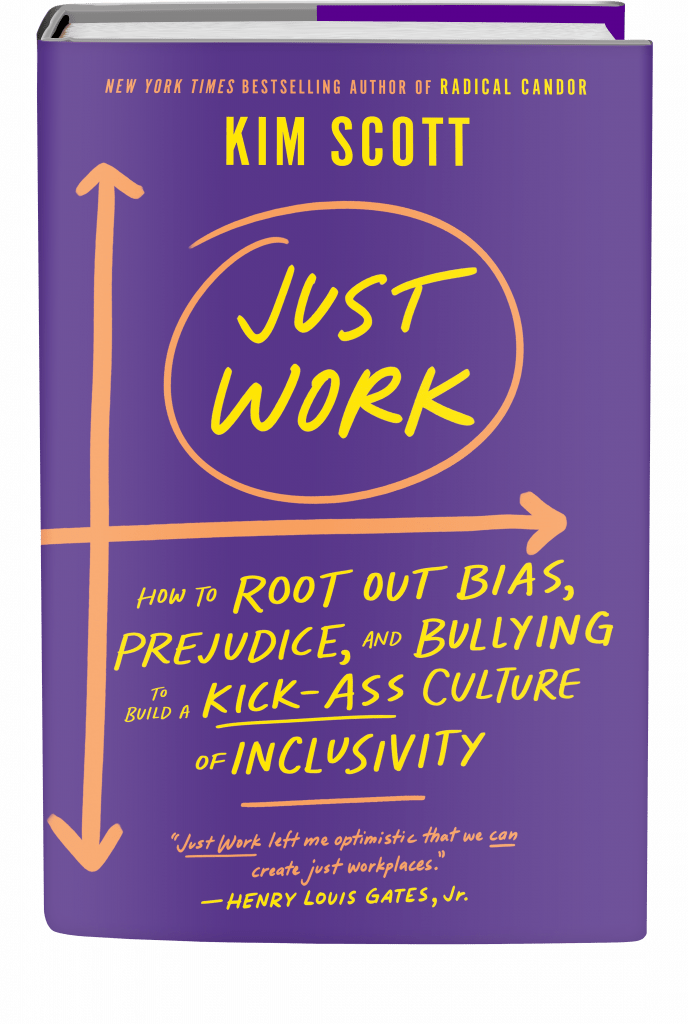Kim Scott is the author of Radical Candor: Be a Kick-Ass Boss Without Losing Your Humanity and Radical…
You Don’t Have to Pay the A**hole Tax: How to Avoid Working for a Bad Boss
Until about five years ago it never occurred to me to check out who my potential new boss would be when looking for a job. I had always focused on the job itself versus worrying about who I would be working for.
Early in my career, I was often so thrilled to have an offer in an industry (print journalism) struggling to find its feet and remain relevant alongside the rise of online publishing and social media that I didn’t mull over the real-world ramifications of working for a bad boss.
This led to me leaving more than one role in search of a better working environment.
Eventually, before I joined Radical Candor, I found myself up for a dream editorial position at a start-up and I was fairly certain they were going to offer me the job.
There was only one problem — I had a pit in my stomach about accepting what seemed to be, by all accounts, a #careergoals opportunity.
Why was the idea of taking this leap making me feel so uneasy? It was more money; there were benefits; I would have an incredible amount of autonomy; and the tools to establish a strong voice in a divisive media landscape.
As it turned out, my gut was trying to tell me to scratch beneath the surface and I needed to listen.
Listen to Your Gut to Avoid a Bad Boss
“If you are not dying to work for this person, don’t take the job. Trust your gut,” Radical Candor author and co-founder Kim Scott advises.
“If you’re not sure what you think of them, start by making a list of pros and cons. Keep wrestling with it until you get to what is for you the determinative factor. For me, it’s can this person help me take a step in the direction of my dreams, or will they trip me up?”
After a day of walking around feeling slightly sick about taking this new gig for reasons I couldn’t identify — this was more than jitters about taking on an exciting new role — I decided to listen to my gut and do a little research.
I googled the name of the person to whom I would report in this new role and found an archive of abhorrent tweets and other questionable online behavior that immediately made it clear to me there was no way I could accept the job.
I promptly emailed this person and asked them to withdraw my name from consideration.
When they asked why I used the principles of Radical Candor — Caring Personally and Challenging Directly — to tell them that while I was thrilled to be among their top picks for such an exciting position and their mission statement aligned with my values, morally and ethically I couldn’t attach my name to someone who displayed the type of behavior reflected in what I’d found on Twitter.
(Remember folks, tweets are forever — even if you delete them there are usually screenshots floating around.)
They thanked me for my honesty and I felt a huge sense of relief after taking myself out of the running. I’d been saved from months of mental, emotional and financial upheaval by trusting my gut instead of ignoring my instincts and having to leave once I was already working for the organization.
Because — you guessed it — bad bosses are the number one reason people leave their jobs.
Bad Bosses Are the No. 1 Reason People Leave Jobs
According to a new survey titled Horrible Bosses: A Survey of the American Workforce from GoodHire, 82% of people surveyed across 10 industries said they would quit their job due to a bad manager.
Most respondents defined a bad boss as someone who is “overbearing and micromanages, as well as a manager who expects them to work outside of working hours.” What people most desire in a boss is an honest and authentic manager.
What’s more, “Only 32% of all American workers surveyed believe that management really cares about their career progression,” the survey notes. “Without a manager who cares, who communicates and who motivates, employees will continue to look for what’s next and for what’s better for them.”
Obviously, it’s preferable to avoid working for a bad boss in the first place versus having to leave an organization and look for a new job. What could I have done in the interview process to be more proactive about avoiding working for a bad boss?
According to Kim in an episode of the Radical Candor podcast, there are some questions you can ask your potential employer to get a better read about whether you’re going to love working for them or it’s going to be your worst nightmare.
Avoid a Bad Boss by Asking These Questions
You want a boss who is respectful of the people who work for them, not a boss who tries to lord power over their employees or who thinks the job is a value judgment rather than a responsibility they’ll be held accountable for. Ask your potential new boss:
- What is your management philosophy?
- A lot of bosses won’t be able to articulate exactly what a boss does. “It took me a long time to figure this out when I was writing Radical Candor — bosses get and give feedback from and to their o teams, in order to achieve results,” Kim says. “But you want them to have some idea of what their responsibilities as a boss are.”
- Dig into the details here. If someone says something that sounds buzzwordy or you’re not sure what it means, ask them for a specific example of what they mean.
- Beware of absentee and micromanaging philosophies.
- You want a boss who solicits feedback and then responds well to it — who has a growth mindset.
- Ask your prospective boss about a failure. Who told them they were failing, and what did they learn from the experience? If they tell you about a time when one of their employees told them they were screwing up and they responded well, that’s a really good sign.
- Ask your prospective boss how they like to receive feedback. (Your real question here is, “Will you take feedback if I give it to you?”)
- Try giving your prospective boss feedback about something you observed during the interview process, and notice how they respond.
Reference Check Your Future Boss
You already know your boss is checking your references. What you might not be aware of is that you have every right to check their references, too. And asking the above questions wouldn’t have uncovered the tweets I found. This is where, if you’re still unsure, you need to go a step further.
In a column for Harvard Business Review, David Galloreese, who leads people and culture at Medallia, writes that it’s an accepted and perfect legitimate practice to reference check your boss.
“You can ask other interviewers what it’s like to work with that person. You can use LinkedIn to find your potential boss’s former direct reports or business partners and reach out for their thoughts,” Galloreese advises.
“Social media can help you identify shared connections and point you to who can give you insights. Through both digital and analog means, you can also find out if he or she is in any clubs, associations, or alumni groups where you have contacts and can seek information,”
If you’re worried about the broader company culture — we all know your boss’s boss could be a bad boss — make sure your new boss acts as a buffer instead of a screen.
“It’s true that your boss’s boss can have a huge impact on how your boss behaves. But I’ve worked for some people who were incredible shit umbrellas — who shielded me from toxicity they were experiencing,” Kim says.
“Others, however, are like shit funnels… If you are worried about the broader culture, make sure you’re working for a shit umbrella and not a shit funnel.”
Overall, don’t ignore red flags during the hiring process that will likely be much more difficult to dismiss once you start working there — you don’t have to pay the a**hole tax.
Learn more about avoiding bad bosses on the Radical Candor podcast >>
————————————————————————————————————————————————————————————–
Sign up for our Radical Candor email newsletter >>
Shop the Radial Candor store >>
Need help practicing Radical Candor? Then you need The Feedback Loop (think Groundhog Day meets The Office), a 5-episode workplace comedy series starring David Alan Grier that brings to life Radical Candor’s simple framework for navigating candid conversations.
You’ll get an hour of hilarious content about a team whose feedback fails are costing them business; improv-inspired exercises to teach everyone the skills they need to work better together, and after-episode action plans you can put into practice immediately to up your helpful feedback EQ.
We’re offering Radical Candor readers 10% off the self-paced e-course. Follow this link and enter the promo code FEEDBACK at checkout.






